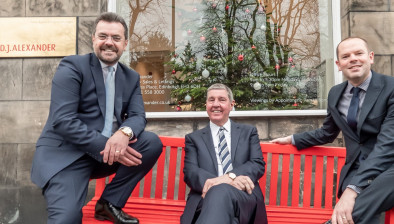DJ Alexander: Rollercoaster ride for Scottish property market in 2021
The Scottish property market had a rollercoaster performance in the last year according to DJ Alexander Ltd, part of the Lomond Group which is the largest lettings and estate agency in Scotland.

David Alexander
The firm believes that the property market – from homebuyers to tenants, to landlords and investors – has had a stronger period of growth this year than many would have expected or could even have hoped for.
The housing market has proved to be extraordinarily robust with some parts of Scotland – such as Edinburgh – experiencing double digit sales growth and prices which even the most optimistic estate agent would have struggled to predict. Demand has outstripped supply and been maintained throughout the year even when the lower Land and Buildings Transaction Tax (LBTT) relief ended in March indicating that the reduced tax liability was not the primary driver of the housing market.
Indeed, one of the more unusual elements of the story of 2021 is the way in which the private rented sector (PRS) has also bounced back remarkably well. From a depressed market at the start of the year we have witnessed unprecedented demand for properties and a substantial increase in the volume and value of landlord investment.
According to the latest LBTT statistics which cover the period up to November 2021 (the latest for which figures are available) the value of revenues from residential sales for the Scottish Government increased by 92.4% year on year. Taxes collected increased by £178m from £192.7m in 2020 to £370.7m in the eleven months to November 2021.
The results for those paying the additional dwelling supplement (ADS) which includes landlords, property investors, and second homeowners increased by 79.2% over the same period rising by £66.9m from £84.5m in 2020 to £151.4m by November 2021.
David Alexander, the chief executive officer of DJ Alexander Scotland, commented: “The last year has been both surprising and remarkable. Nobody believed that the residential market would continue to be so buoyant during a time when many people must have had very real concerns about their future employment and income. Yet we have seen record house price rises and surging demand.
“The latest LBTT statistics show just how great that demand has been. The last six months (June to November) of revenue raised have been the highest ever recorded since the tax was introduced bringing in just under a quarter of a billion pounds (£249.0m). This reveals the scale, degree, and character of this property boom.
“That these record numbers are also reflected in the statistics for those paying the additional dwelling supplement indicates that it is not just homeowners who see Scotland as a great place to buy. Landlords, investors and second homeowners have contributed £94.0m to the Governments’ coffers in the last six months alone with the highest ever single month figure of £19.0m being raised in November.
“What this tells us is that property has been, and continues to be, one of the vital elements of the pandemic. People needed to have a place to stay that was important to them and contributed to their wellbeing. It was as if people suddenly remembered that there are few things more important than where you live.”
He concluded: “For the market the last year has been remarkably resilient for individuals and investors. Prices have continued to rise, and, despite this, individuals, landlords, and investors have all stepped in as they realise that there is still great potential value in the Scottish marketplace. Despite the promise of higher interest rates in the next 12 months, I believe that the rises of the last year will be sustained into the New Year. Perhaps not at the same level of increase but still positive. Given that we are also likely to see the return of many thousands of EU citizens once the impact of covid reduces in Europe I believe that the private rented sector may experience something of a boom in the coming year.”







